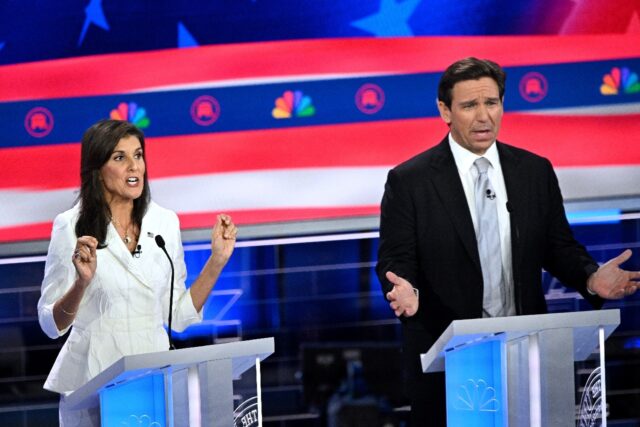With Donald Trump so far ahead in the race for the Republican presidential nomination, Americans could be forgiven for dismissing it as a coronation rather than a genuine contest.
Yet with days to go until the first votes in Iowa and New Hampshire, the ex-president’s rivals insist there is much more at stake in the “undercard” contest than a second-place consolation prize.
They point to polling data showing voters turning against Trump in the all-important swing states if he is convicted in any of the four criminal trials he faces as he runs for a second White House term.
The 77-year-old tycoon is also contending with efforts in multiple states to disqualify him from primary contests under the 14th Amendment, which bans from office government officials who have engaged in insurrection.
With surging poll numbers and a slew of high-profile endorsements, former South Carolina governor Nikki Haley looks best placed to capitalize in the unlikely — but not inconceivable — event of a Trump implosion.
Poll after poll has shown her beating President Joe Biden in November by larger margins than Trump or Florida governor Ron DeSantis, her closest rival in the chasing pack.
“Regarding a path to the nomination for DeSantis or Haley — while challenging, it’s not impossible. Political landscapes can shift rapidly, and primary races often have unexpected turns,” top Republican strategist Charlie Kolean told AFP.
Juggernaut
Neither challenger has gone for the jugular over the many legal issues facing Trump, who is accused of leading a criminal conspiracy to stop the rightfully-elected Joe Biden from becoming president, culminating in the 2021 assault on the US Capitol.
This reticence has led critics of the undercard — which also features political newcomer Vivek Ramaswamy and longshot former New Jersey governor Chris Christie — to argue that the contenders aren’t really trying to win.
Accepting the inevitability of the Trump juggernaut, they are looking instead to 2028, the theory goes — or, in the case of Ramaswamy, for a position in the next Trump cabinet.
To be clear, Trump takes a larger share in opinion polling than Haley and DeSantis combined in each of the four early nominating states. But both say they see a path to victory over the ex-president.
DeSantis — a hard-line populist in the Trump mold — remains in number two spot in Iowa, and is pinning his hopes on an above-par outcome propelling him into New Hampshire with a wind in his sails.
The more moderate Haley has overtaken DeSantis nationally, however, buoyed by solid performances in the primary debates and major endorsements from the business community and political establishment.
Shying from the cultural battles that have been a mainstay of the DeSantis campaign, Haley has stressed the need for reform of the welfare system, finding political consensus on abortion and support for aid to Ukraine.
The more isolationist DeSantis points to his record of getting domestic conservative priorities — from abortion curbs to parental choice in education — onto Florida’s statute books.
‘We should care’
Haley has avoided the negative headlines for runaway spending and staff churn that have dogged DeSantis, although her failure at a recent town hall to identify slavery as the cause of the Civil War gave aides heartburn.
She is still well-placed to mount a serious challenge in New Hampshire, say her backers, especially if Trump underperforms in Iowa.
For Henry Olsen, a senior fellow at the conservative Ethics and Public Policy Center think tank, the undercard contest provides insights into a post-Trump Republican Party.
“We should care because, unlikely as it is, miracles do occasionally happen and the winner will be a top candidate in 2028, when Trump will be either termed out or will likely not run due to age, legal issues and losing,” he told AFP.
Analysts concede however that both Haley and DeSantis have a mountain to climb.
The latest edition of the influential Des Moines Register Iowa Poll shows 51 percent of likely Republican caucus-goers picking Trump, up from 43 percent in October.
“It’s not just about who finishes second; it’s about shaping the future of the Republican Party,” Kolean, the Republican strategist, told AFP.
“Understanding the positions and support bases of Haley and DeSantis reveals emerging trends and factions within the party, which could influence its direction beyond 2024.”

COMMENTS
Please let us know if you're having issues with commenting.